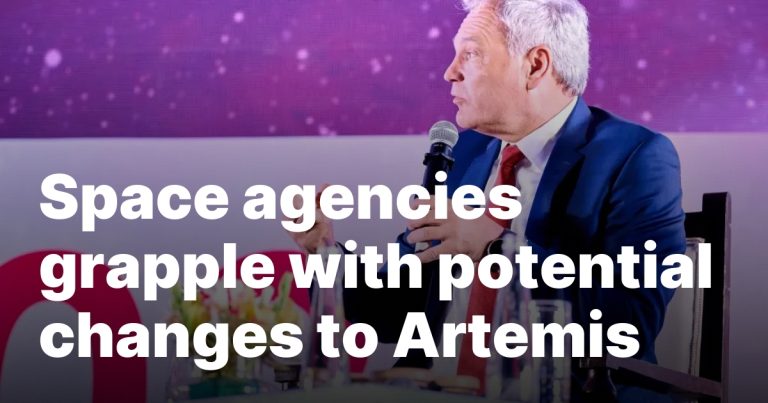WASHINGTON — Space agencies working on the NASA-led Artemis lunar exploration campaign said they plan to continue work on their contributions despite NASA’s current budget uncertainty, even as some consider alternative cooperation.
At the Global Conference on Space Exploration (GLEX) 2025, held this week in New Delhi by the International Astronautical Federation, a key topic in plenary sessions was the uncertain future of Artemis given a top-level budget released by the White House May 2 that proposed canceling the lunar Gateway and ending the Space Launch System and Orion programs after the Artemis 3 mission.
Those proposed changes would, in enacted, significantly affect space agencies in Canada, Europe, Japan and the United Arab Emirates, who are all participating on Orion or Gateway as well as offering longer-term contributions to Artemis such as landers and rovers.
“Artemis is one of our most important topics,” said Walther Pelzer, director general of the German Space Agency, noting that Germany plays a leading role in the production of the European service module for Orion. “So, we are very keen to see what is going over there.”
Speaking on a panel in one plenary session, he said he had questions about the plans in the budget proposal to shift from SLS and Orion to commercial systems after Artemis 3. “If this plan will be put into practice, a lot of question marks show up,” he said, such as the many development milestones SpaceX’s Starship still must achieve. “I can’t picture that the U.S. will have such a big gap between Artemis 3 and really being capable of going to Mars, and open up space for others to be the leading nation in exploration.”
“I think the UAE’s position is similar,” said Salem Al Marri, director general of the Mohammed Bin Rashid Space Centre in the United Arab Emirates, which is contributing the airlock module for the Gateway. He said the country is trying to be flexible given the budget and programmatic uncertainty.
“We have to be quite nimble,” he said, adjusting to any changes in the program as Congress deliberates on the NASA budget. If there are changes, “we have to see how we can move with them and keep these collaborations going.”
Others, such as officials from the European Space Agency and Canadian Space Agency, said they would continue work on their Artemis contributions as the budget debate plays out.
“We will commit on our side to contribute what we have promised,” said Josef Aschbacher, director general of ESA, in another panel. “We have always been a reliable partner and we will continue to do so. If things change, we will need to adjust, and we will be ready to do that.”
“We are following very closely the budgetary decisions that are being made right now in the U.S., but continuing to work on Canadarm3,” said Jill Smyth, director of space exploration planning, coordination and advanced concepts at the Canadian Space Agency, which is providing the Canadarm3 robotic arm for Gateway.
“I’m an optimist,” said Pelzer, citing past NASA budget requests that have proposed canceling programs only for Congress to instead keep their funded. “Until we really have the final budget, we will stay with the way ahead. We will show to our NASA partners and the other partners in Artemis that we will put everything in place to make sure that the Artemis program will be put into practice.”
Rethinking international cooperation
Notably absent at GLEX 2025 was NASA, which did not participate in any of the plenary sessions. NASA has curtailed travel in response to an executive order, and one industry source noted that NASA leadership met with many of the agencies represented at GLEX just weeks earlier at the Space Symposium in Colorado.
Some in the plenary sessions said there is now an opportunity to rethink existing structures for international cooperation, like the partnership used for the International Space Station. “I think we need to develop alternative cooperations than the ones we were used to,” said Caroline Laurent, director of orbital systems and applications at the French space agency CNES.
“We should look more into cooperation with one another, the ones that are here today, actually: ISRO, the Emirates, Canada, JAXA,” she said. “We should plan more missions with one another in the future.”
On the sidelines of GLEX, ESA and the Indian space agency ISRO signed a statement of intent May 7 for increased cooperation between the two agencies. The agencies said that they will work together to ensure interoperability of docking systems on spacecraft they are developing as well as astronaut training. ESA may also fly payloads on ISRO’s POEM missions, which use the upper stages of rockets as short-term experiment platforms in low Earth orbit.
The agreement could open the door to European missions to India’s proposed space station, the Bharatiya Antariksh Station, which ISRO plans to have in orbit by the mid-2030s.
“The complexities and costs of space missions often surpass the capabilities of just one nation,” Aschbacher said in a statement about the agreement. “ESA’s collaboration with international partners such as ISRO exemplifies the power of shared expertise and resources.”

